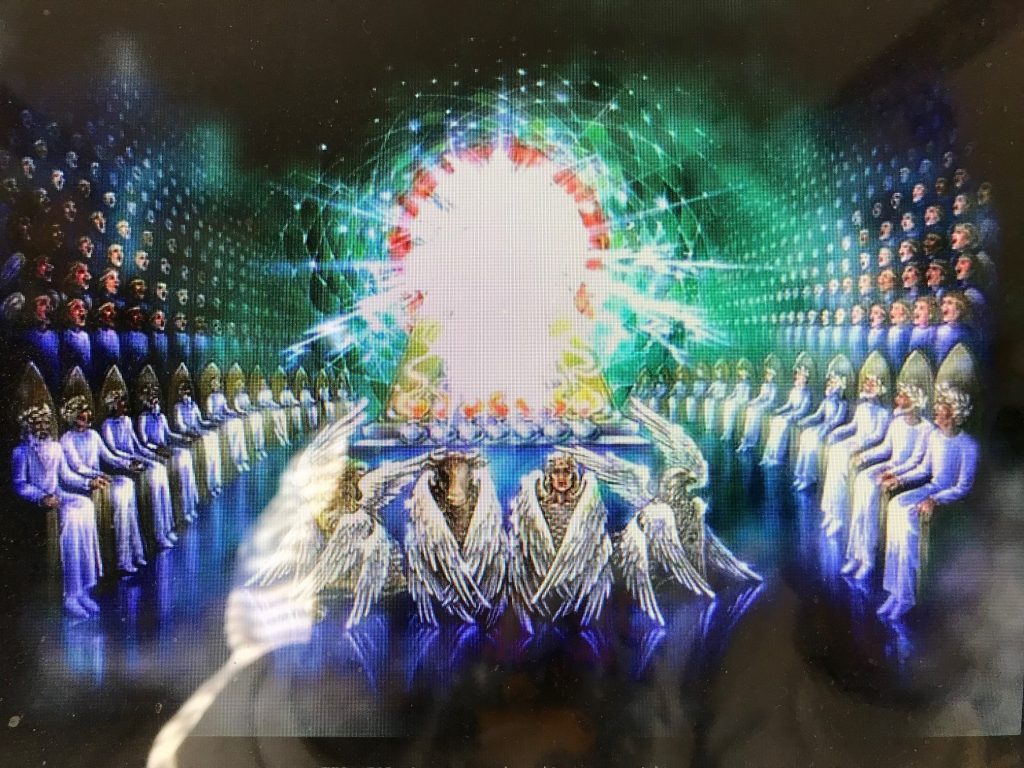Readings: Exodus 40:17–21, 34–38 | Titus 3:4–7 | John 1:1-18
Text: John 1:1-14
In dialog, God always goes back to the beginning, the foundation upon which He built. Consider these examples from Jacob, Moses, and the prophet Isaiah:
“And behold, the Lord stood above it and said, “I am the Lord, the God of Abraham your father and the God of Isaac. The land on which you lie I will give to you and to your offspring.” (Genesis 28:13)
“I am the Lord your God, who brought you out of the land of Egypt, out of the house of slavery.” (Exodus 20:2)

“But you, Israel, my servant, Jacob, whom I have chosen, the offspring of Abraham, my friend; you whom I took from the ends of the earth, and called from its farthest corners, saying to you, “You are my servant, I have chosen you and not cast you off”; fear not, for I am with you; be not dismayed, for I am your God; I will strengthen you, I will help you, I will uphold you with my righteous right hand.” (Isaiah 41:8-10)
The beginning of the Gospel according to St. John is no exception. The Holy Spirit directs our attention all the way back to the beginning of creation and man in it, to our rebellion, and to God’s steadfast pursuit of His creature, fallen man.
But this is far more than the voice of a disciplinarian who wants his wayward servants to get in line. Your God wants ever so much more; He wants to dwell in your midst as He once did in the Garden before sin.
We heard of this in the Old Testament lesson and the building of the tabernacle. The story of Israel is that of God working to dwell in the midst of His people. It runs through the promise of the land, to the ornate engravings in the Tabernacle and Temple which hint at Eden restored, and through the substitutionary sacrifices which restore peace with their God. The apex of it all is that God dwells (or tabernacles) in the midst of His people.

Yet tabernacling in a building was not God’s final goal. For how close can He be when His holy presence must be mediated by blood of sacrifices and smoke of incense?
9 The true light, which gives light to everyone, was coming into the world. 10 He was in the world, and the world was made through him, yet the world did not know him. 11 He came to his own, and his own people did not receive him. 12 But to all who did receive him, who believed in his name, he gave the right to become children of God, 13 who were born, not of blood nor of the will of the flesh nor of the will of man, but of God.
14 And the Word became flesh and dwelt among us, and we have seen his glory, glory as of the only Son from the Father, full of grace and truth.
He desires to tabernacle among us creatures, becoming a creature Himself.
This is to deal with sin once for all, no longer answering for human sin with animal blood. He puts Himself under the curse, “The soul who sins shall die” (Ezek. 18:4), so that He would gain reprieve for us. The Word became flesh to suffer the agony of this body and life and to weep bitter tears in His mortal weakness. He became flesh so that He could close His eyes and breath His last as we do, and to triumph over it.
The Word became flesh in order to speak His Word not through an intermediary of a prophet or a dream. Upon human lips, the very voice of God is heard: “Amen, amen, I say to you…” [Matt. 5:18; John 3:3; et al]

The Word became flesh and tabernacled among us to share with us in our mortal weakness—”to be finite and circumscribed, to suffer and die, to ascend and descend, to move from one place to another, to suffer hunger, thirst, frost, heat”[1] All so that, as St. Paul writes, “taking the form of a servant, being born in the likeness of men. 8 And being found in human form, he humbled himself by becoming obedient to the point of death, even death on a cross.” (Phil. 2:7-8) Yet being sinless as He is, He now in glory, intercedes for us and knows our pains, temptations, and enemies personally.
Far more than in a building, God tabernacles in our flesh.
There is still more that He seeks. Yes, He tabernacles in the flesh of mankind, but still more, He has come to tabernacle with you:
12 But to all who did receive him, who believed in his name, he gave the right to become children of God, 13 who were born, not of blood nor of the will of the flesh nor of the will of man, but of God.
He is working to restore that fellowship with man and woman He had so long ago (for us) now. He has come to be received by you as your Immanuel, God with us. Your Jesus, your Lord and your God [John 20:28]. Saying it that way doesn’t diminish His majesty, or the magnitude of His saving work. Rather, it expresses the truth that the God of Abraham, Isaac, and Jacob, who led Israel out of Egypt, who calls a people for Himself from the ends of the earth, has also come for you. “When I look at your heavens, the work of your fingers, the moon and the stars, which you have set in place, what is man that you remember him, and the son of man that you visit him?” (Psalm 8:3-4, alternate translations of underlined words, זכר and פקד)

And what this means is that you are more than what your flesh and the world tell you. In times of anguish and uncertainty, we feel that God is far off and uncaring. If He really cared, He wouldn’t have let this happen! When we have been belligerent and neglectful of His Word, our shame tells us that God hates us. There’s no way the things I’ve done or thought or said could ever be atoned for!
Do not be unbelieving, but believe that God is constantly working for you to dwell with Him and He to dwell with you! You, who lament your folly, do not think God has forsaken you, because as a man Christ has taken that for you too. The extent He has gone to in order to bring you back, taking you from death to life, shows just how serious your God is to deliver and preserve you.
By the strength of His might, He has brought you to Himself. In the trustworthy sign of Baptism, “He saved you in the washing of regeneration and renewal of the Holy Spirit,” (Titus 3:4-7, Epistle reading) whom He has poured out richly on you. He will assuredly not forsake you now, no matter how much hurt you bear, how much the Devil is pressing you, or how you have wandered in the past.
At the Last, you will enjoy an even closer dwelling than we have known so far. For He promises in that day to remove sin, death, and the devil far from us. And of this, the Holy Spirit gave this vision to St. John:

22 And I saw no temple in the city, for its temple is the Lord God the Almighty and the Lamb. 23 And the city has no need of sun or moon to shine on it, for the glory of God gives it light, and its lamp is the Lamb. 24 By its light will the nations walk, and the kings of the earth will bring their glory into it, 25 and its gates will never be shut by day—and there will be no night there. 26 They will bring into it the glory and the honor of the nations. 27 But nothing unclean will ever enter it, nor anyone who does what is detestable or false, but only those who are written in the Lamb’s book of life.
22:1 Then the angel showed me the river of the water of life, bright as crystal, flowing from the throne of God and of the Lamb 2 through the middle of the street of the city; also, on either side of the river, the tree of life with its twelve kinds of fruit, yielding its fruit each month. The leaves of the tree were for the healing of the nations. 3 No longer will there be anything accursed, but the throne of God and of the Lamb will be in it, and his servants will worship him. 4 They will see his face, and his name will be on their foreheads. 5 And night will be no more. They will need no light of lamp or sun, for the Lord God will be their light, and they will reign forever and ever.
Thanks and praise to the Word made flesh, who lives and reigns with the Father and the Holy Spirit, one God, now and forever. Amen.



